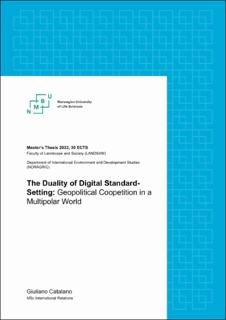| dc.description.abstract | International standard-setting is increasingly falling victim to geopolitical realities. Especially, the digital domain has recently experienced an upsurge in contention. The traditionally consensus-based arena is running the risk of turning into a struggle for power. Against this backdrop, this paper attempts to gain a grounded insight on the roles of China, the European Union, and the United States amid given phenomenon by exploring the current geopolitical power dynamics within the digital standard-setting domain. Incorporating empirical data gathered from a triangulation of methods (including document analysis, a web survey, and elite interviews) this paper demonstrates a duality of both competition, and cooperation within digital standard-setting – hence, a combination of constructing consensus and a struggle for power. In terms of power distribution, said duality occurs in a fragmented world. Accordingly, this paper’s deconstruction of the geopolitical power dynamics within the digital standard- setting domain uncovers a coopetition in a multipolar world. | |
